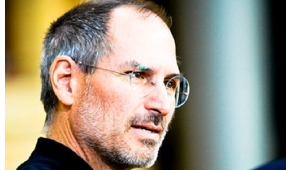The Steve Jobs school of management is back in vogue. According to the most recent surveys, the business person young people most admire is the 55 year-old Jobs, not the 25 year-old CEO of Facebook, Mark Zuckerberg. The management advice venture capitalists are now offering entrepreneurs is to be like Steve.
It hasn’t always been this way. When I was 26, the company I co-founded hired a very wise and gifted CEO, John Kunze, who cited the founder of Apple and NeXT in explaining how to become a better manager.
“Steve Jobs,” John said, “insisted on picking the hardwood floors at NeXT headquarters.”
I paused. “Was that good or bad?”
“It was bad, Glenn,” John said. “How do you think that made NeXT’s floor-picker feel?”
This was in 1998, when Jobs was a cautionary tale of an exiled founder. Since then, I’ve always viewed Jobs’s comeback through the floor-picker’s eyes.
Even as Apple has grown into a $200-billion-market-cap colossus and Jobs has delegated more responsibility, the company has in many ways become more narrowly defined by Jobs’s personality. There were 2,500 self-help books on entrepreneurialism published last year, but few account for the role of Jobsian mania in building a company. Business schools and conferences have institutionalized entrepreneurialism as an avocation like law or medicine when it is more often a streak of temperament, luck and inspiration. Far from a program taught by somebody else, entrepreneurialism has always been for me my only shot at being myself.
Personality as Pressure
But what if, as John rightly noted, being yourself means disregarding everybody else? Google’s Larry Page and Sergey Brin personally approved most of Google’s 20,000 hires, Facebook’s Mark Zuckerberg special-ordered insulting business cards, and Tesla’s Elon Musk announced his intentions to out-breed an entire planet of lesser beings. We treat this outrageousness as an idiosyncrasy or a side-effect when it actually feels to me like a company’s driving force. Nothing less can make the work of so many feel individual and authentic.
At the company I now lead, Redfin, I drive myself nuts evaluating perfectly well-done projects wondering why each isn’t more Redfin, more wonderful. But what if my taste in wonderful isn’t actually wonderful? And is it even fair to ask for wonderful? What are the words you use to ask?
One of my first bosses, the brilliant Kirill Sheynkman, knew how to ask. Whenever I tried to show him my work he’d hold up a hand and say: “WAIT… Is it sweet?”
I still remember running out of time on a design, and just sending him what I had. When I walked into his office, he’d printed out the design and left it lying on an ominously clear desk. He sat at the desk, hands folded together. How long had he been there? His posture was magnificent.

“What is this?” he asked.
“You mean it’s a little late?”
“I mean what THE **** is this?”
“And it’s kind of half-done?”
“I mean WHAT?” Kirill said, with real emotion. It’s so hard to know which surrender to mediocrity will be your last.
“And even if it was totally done it would just be really, really lame?”
“I mean… YEAH,” Kirill said.
The Company is the Ultimate Work of Art, Not the Product
Kirill made me feel how he felt: that a startup can be almost as individual and coherent as a work of art, not simply in what it makes but in and of itself, how it runs, who it is.
Take Zappos, one of 2009’s hottest companies. What sets Zappos apart isn’t its technology or business model—shoe e-commerce—but its culture. When I toured Zappos, it was like visiting a new planet: the visitor beside me was asked to ring a bell and share his most embarrassing memory; employees cheered as we walked by; I got photographed wearing a Burger-King-style crown.
A company’s personality is the most profound innovation of a founder and her team, as ubiquitous, unnoticed and essential as air. It becomes a source of meaning for employees and consumers, and then it becomes a source of revenue.
People don’t pay more for an iPhone based on features and facts. We pay for its strong opinions—about the primacy of beauty and simplicity—which connect with what we like best about ourselves. What this whole Astroturf-covered, media-drenched world is starved for is a little personality.
This personality is so deeply embedded in a great company’s DNA that it can be found in its smallest fingernail clipping: Richard Branson’s bull-and-matador Virgin Air videos, the Flickr cofounders’ cheery “Mabuhay” greeting (“Now you know how to say hello in Tagalog”) or, more seriously, Google’s decision to abandon the world’s largest market—which could never have happened at a company not driven by its founders.
We all applaud Google’s decision. But how many objections from reasonable people did Larry and Sergey squash to get their way? What most of us lack isn’t our own idea of right and wrong, but the conviction to see it through.

It’s hard to do that if you’re sensitive to how others feel. For the first time in centuries, the creators in our economy are its rulers, their personalities shaping not only their products but entire companies. It’s as if, instead of being confined to an insane asylum, Vincent Van Gogh were allowed to direct the activities of thousands. As John realized, the results are harrowing, but also occasionally beautiful on a scale the world could have hardly imagined.
Glenn Kelman is the CEO of Redfin, an online real estate broker trying to change the real estate game in consumer’s favor. Previously, he, Kirill Sheynkman and Joe McVeigh co-founded Plumtree Software, which went public in 2002 and was later bought by Oracle. Elsewhere for TechCrunch, Glenn has written about second-time entrepreneurs, surviving a recession, what you learn raising money and how to divvy up stock.
Photo credits: Steve Jobs by macevangelist on Flickr; Kirill Sheynkman by Kirill S. on Flickr
































Comment